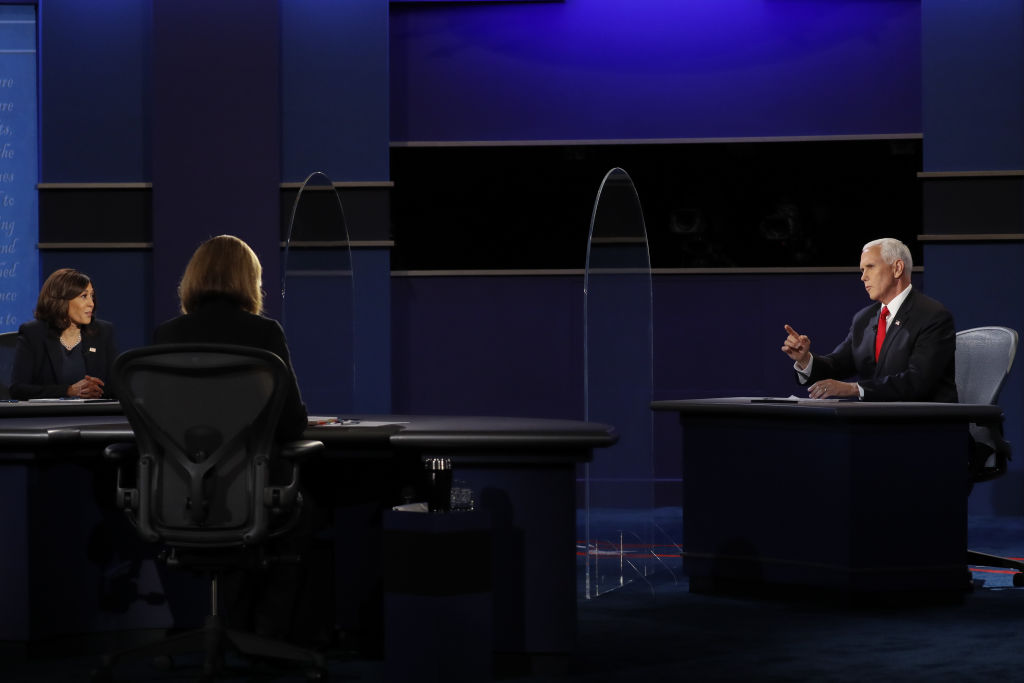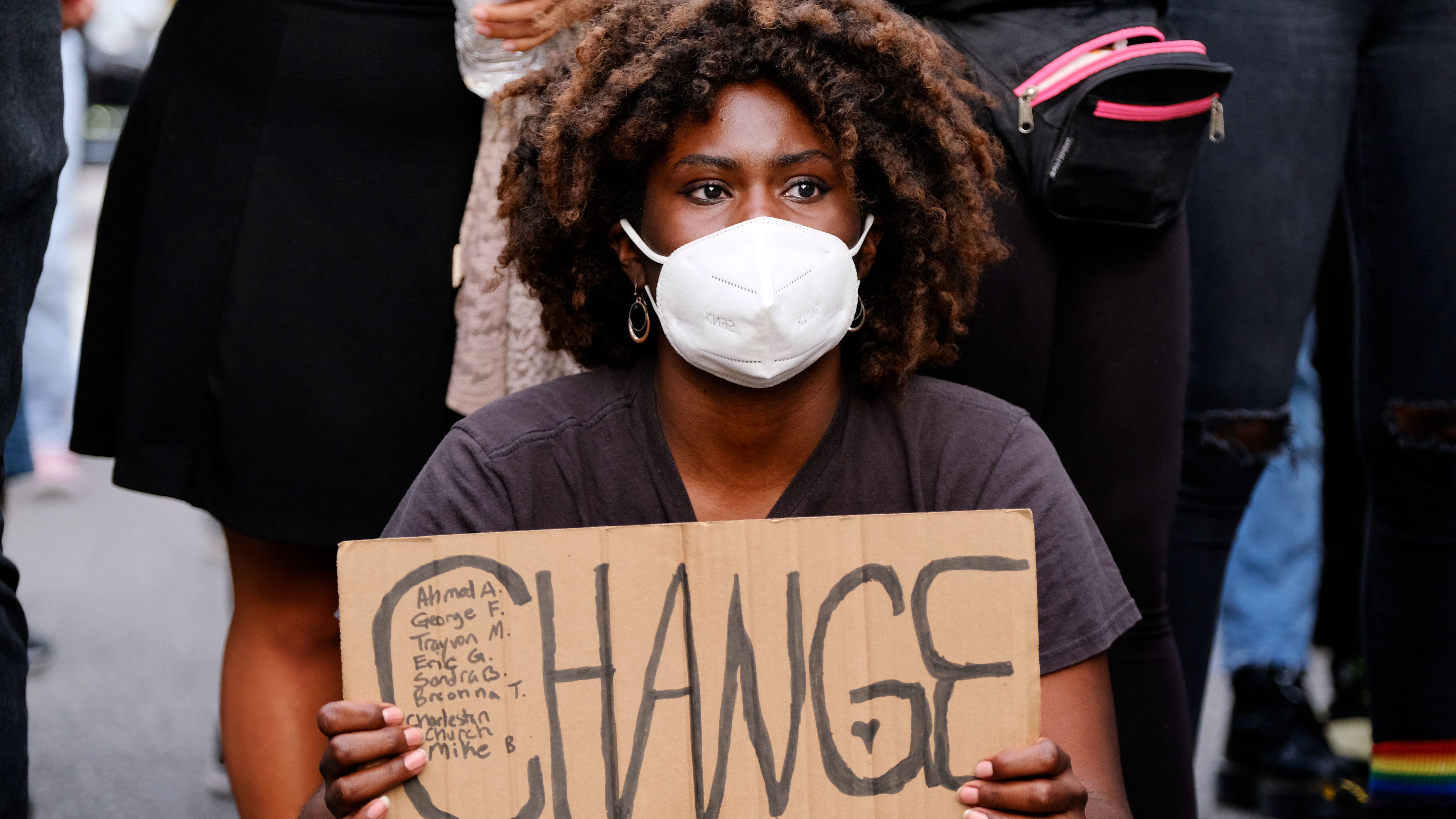Editor's note: Josef Gregory Mahoney is a professor of politics at East China Normal University. The article reflects the author's opinion, and not necessarily the views of CGTN.
One might think the U.S. VP debate was about the numerous topics discussed, including policies related to the pandemic, climate change, taxes, law and order, the economy, and so on. However, above all and regardless of its direct treatment, this debate was really about race and gender.
Despite the numerous challenges facing the U.S., the biggest is related to race. An astute British writer following a long sojourn in America once observed race is to the U.S. what class is to the UK, before acknowledging that racism is actually worse.
In fact, despite years of sensitivity training in schools and workplaces, despite oft-repeated claims of valuing diversity and multiculturalism by government at all levels, by schools at all levels, and throughout the private sectors, despite having elected a Black man president, the U.S. is beset with worsening racial tensions.
Likewise, there are gender-related tensions. On the one hand, while there is a large number of Americans who support Trump due to his racist policies and dog whistle tactics, a large number also support him because they are determined to criminalize abortion and sideline women's reproductive rights. On the other hand, current polling indicates that a majority of American women are backing Biden.

U.S. Vice President Mike Pence (R) speaks as Senator Kamala Harris, Democratic vice presidential nominee (L) listens during the U.S. vice presidential debate at the University of Utah in Salt Lake City, Utah, U.S., October 7, 2020. /Getty
U.S. Vice President Mike Pence (R) speaks as Senator Kamala Harris, Democratic vice presidential nominee (L) listens during the U.S. vice presidential debate at the University of Utah in Salt Lake City, Utah, U.S., October 7, 2020. /Getty
This is not surprising. We are still living in the #MeToo moment. Women are exhausted by Trump's troubled history of sexism and worse. They're tired of his failure to engage positively those issues that matter most to them. They are frightened by his stacking of federal courts with anti-abortionists. And they are sick, sick to death many of them, because women have been disproportionately affected by the pandemic and Trump's gross mishandling of the same.
These two issues, gender and race, which of course intersect in the real world in powerful ways, are personified by the Democratic nominee for Vice President, Senator Kamala Harris: everyone knows that whatever her qualifications — and they are considerable — Biden chose her as a running mate above all because she is a Black woman.
To say it so clearly makes some progressives wince. On the flipside, it prompts accusations of racism and sexism from, well, racist and sexist Trump supporters. But that's just racist and sexist nonsense. This moment, and indeed previous moments, but this one especially, demands a Black woman in a position of power, and not just because diversity is a lofty ideal. Of course it is. Rather, it's because racism and sexism can only be overcome with women in the vanguard.
And there lies the contrast. Opposite Kamala Harris was Vice President Mike Pence, perhaps the whitest man in American politics today and Trump's go-to guy for rallying white religious and social conservatives, a large percentage of whom disparage feminism, are hostile towards LGBTQIA and especially transwomen, and who are committed to what they see as a sacred crusade against abortion.

A Black Lives Matter protester sits and holds a sign for change over the death of George Floyd in Los Angeles, June 2, 2020. /AP
A Black Lives Matter protester sits and holds a sign for change over the death of George Floyd in Los Angeles, June 2, 2020. /AP
The "angry Black woman" is one of the more common stereotypes of African American women. In fact, while many researchers agree this stereotype is harmful, they are split on whether it's an apt description. This is all the more confusing because some Black women embrace it. Standing at the intersection of racism and sexism, they argue, anger is both reasonable and justified. Nevertheless, it's not the sort of label a candidate for national office wants, particularly the first Black woman to be nominated for the vice presidency.
This presents a double challenge for Harris. On the one hand, she is known for being a sharp and tough politician and debater. On the other hand, U.S. vice presidential candidates are generally expected to bulldog their opponents. Harris is no Michelle Obama, who conscientiously curated a public image that deconstructed the stereotype. But a First Lady can do that if she chooses. A vice presidential candidate can't.
And yet, in this respect Harris was "helped" by Pence, repeatedly. Social media have lit up with women expressing disdain for Pence's constant rudeness to Harris, his talking over her, his interruptions. This was the strategy Trump deployed against Biden; but when a white man does it to a woman, a Black woman no less, and on national television, it sends a very clear message, one that resonates with the experiences that many women have every day at home and work.
And when women see that happen, they're angry. But they don't see Harris that way. They see her as confident. They see her as the solution to a problem they all face.
So poor Mike Pence. Poor because he can't seem to help himself, can't seem to transcend the very reason he was chosen as Trump's running mate—because he's a white male conservative — but also poor because he was and is Trump's running mate.
Indeed, Pence joined Trump's unholy crusade in part to advance his religious causes, but also because he harbors his own presidential ambitions. Nevertheless, he works for a man who not only sucks the air out of the room, he sucks it out of the entire country. With lungs still weak from COVID-19, no less.
Pence might believe he's earned his ticket to heaven by keeping Trump on the narrow when it comes to appointing federal judges, but surely he's ruined his own political brand. Maybe that's enough for him, for as they say, the future lasts forever, and perhaps the U.S. is on the cusp of a generational shift that will consign national-level candidates like Pence to the dustbin of history.
Even when Pence was given center stage over the past four years, Trump would crowd him out. This happened constantly, both in terms of public appearances and policymaking. With the latter, for example, Pence's own pandemic guidance for the White House was disavowed by Trump, Trump got COVID-19, still flouted the guidance afterwards, and claimed his infection and recovery was a gift from God.
And he did so in a video released a few hours before the vice presidential debate. Both stealing Pence's moment and undercutting his position, making him more susceptible to hard questions in the debate. Poor Mike Pence. Political dead meat, already drawing flies. Indeed, the fly that kept landing on his forehead during the broadcast is already a viral media star.
On the whole, the debaters were both guilty of dodging questions and hitting their talking points instead. This is, unfortunately, what happens in a highly polarized country where real debates are impossible to have. But in terms of what this debate was really about, gender and race, the outcome was never really in doubt. Harris won, in a landslide.
(If you want to contribute and have specific expertise, please contact us at opinions@cgtn.com.)